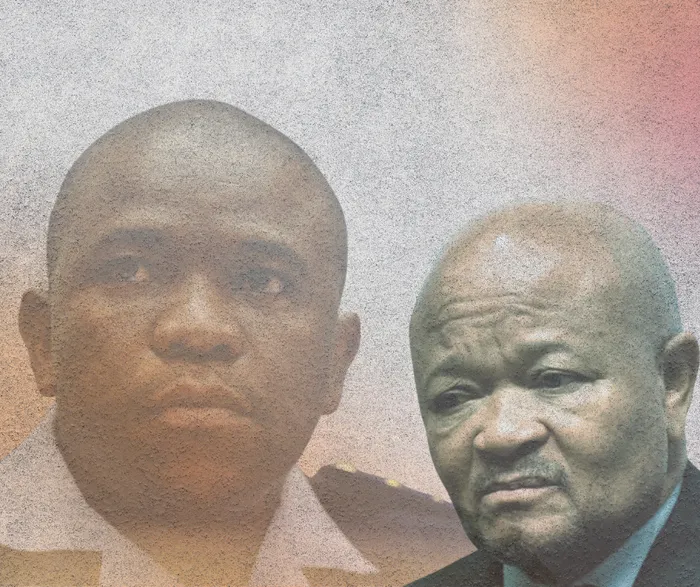
All eyes will be on the KwaZulu-Natal SAPS Commissioner Lieutenant General Nhlanhla Mkhwanazi, who is expected to be the first witness to testify at the Madlanga Commission of Inquiry after he made damning allegations against Police Minister Senzo Mchunu in July.
Image: IOL Graphics
All eyes will be on KwaZulu-Natal SAPS Commissioner Lieutenant General Nhlanhla Mkhwanazi, who is expected to be the first witness to testify as the Madlanga Commission of Inquiry prepares to hold its first public hearing on Wednesday.
The hearing will be held at the Brigitte Mabandla Justice College in Pretoria.
The commission, led by retired Justice Mbuyiseli Madlanga, will investigate alleged corruption within the country's criminal justice system.
KwaZulu-Natal SAPS Commissioner Lieutenant General Nhlanhla Mkhwanazi is expected to be the first witness, testifying for three to four days.
Mkhwanazi made explosive allegations on July 6 about political interference in the criminal justice system, implicating Police Minister Senzo Mchunu and Deputy SAPS Commissioner Shadrack Sibiya in allegedly conspiring to disband the political killings task team.
Mchunu and Sibiya have denied the claims.
Sibiya has since been suspended by National Police Commissioner General Fanie Masemola after losing a high court bid to overturn a decision to be placed on a leave of absence.
The commission will also examine 121 political killing dockets following a decision taken to return them to KwaZulu-Natal.
Commission spokesperson Jeremy Michaels said yesterday that consultations with Mkhwanazi will continue over the next few days leading up to the first public hearing on Wednesday.
He confirmed that Mkhwanazi will be the commission's first witness, testifying for an anticipated three to four days or possibly longer.
Following Mkhwanazi's testimony, a lengthy list of other witnesses will take the stand, but due to security concerns, their identities will not be disclosed, according to Michaels.
He said: “If true, the allegations made by Lt Gen Mkhwanazi on July 6, 2025 hold grave implications for the rule of law and our constitutional order, and it goes without saying that the work of the Commission is significant for the safety and security of all South Africans.”
The allegations, he said, centre around criminal syndicates and drug cartels infiltrating and improperly influencing decision-making within the SAPS, including the Political Killings Task Team and crime intelligence.
Weighing in on the Commission’s work, Dr Sysman Motloung of North West University believes that the proceedings will likely confirm the public's perception of South Africa as a "crime scene".
Motloung's concerns stem from the government's ineffective approach to combating crime, which he describes as "largely rhetorical" with little meaningful action taken against criminals.
He said Mkhwanazi's allegations in July did not necessarily reveal new information, as the public was already aware of suspicions about police collusion with criminal elements in various sectors.
“My view is that the testimony won’t be a big deal because the police are aware of the rot within their ranks. If anything, a change of heart is necessary. It is good that the rogue police element is looked at systematically through the commission of inquiry,” he said.
He, however, said the testimony can improve SAPS’ effectiveness if the leaders implement corrective measures from its content, even before the commission ends.
Motloung said: “To a large extent, the government has used rhetoric in fighting crime with no consistent and punitive measure towards criminals. The ANC’s legitimacy is already tainted, the commission report can make it worse.”
Khanya Vilakazi, a political analyst from Mpumalanga University, believes that Mkhwanazi's public allegations were a bold move, akin to "firing the first shot".
He noted that the Commission's role will be to make recommendations on next steps, but this process may be an attempt to control certain aspects of the narrative.
He suggested that this could taint the outcome, given the current political landscape where certain parties are more closely associated with specific issues.
“Today if I speak about political killings nobody thinks about the DA. And yet again if I speak about political interference nobody thinks about the EFF,” he said.
Michaels said due to the sensitive and high-risk nature of the Commission's work, it is taking all necessary precautions to protect lives, which includes holding some proceedings in camera to safeguard witnesses.
The Commission is expected to submit an interim report within three months and a final report within six months.
Michaels said while the timeline is tight and the commission has no doubt that it will need some more time, “the Commission is squarely focused and working diligently to complete the task at hand”.
“Having said that, we don’t know where the investigations will lead and so it’s difficult to determine how much more time will be needed,” he said.
The Commission's R147.9 million budget has sparked debate, with critics questioning whether the outcomes will justify the expense.
As part of the budget, employee compensation will account for R10.898m, while business and advisory services, including investigators and legal researchers, will receive R11.157m
The legal team and evidence leaders are allocated R19.918m while travel and subsistence costs, including witness and staff expenses, are estimated at R2.678m.
The majority of capital assets, R35.969m, will be invested in securing ICT infrastructure, including computers, servers, and laptops.